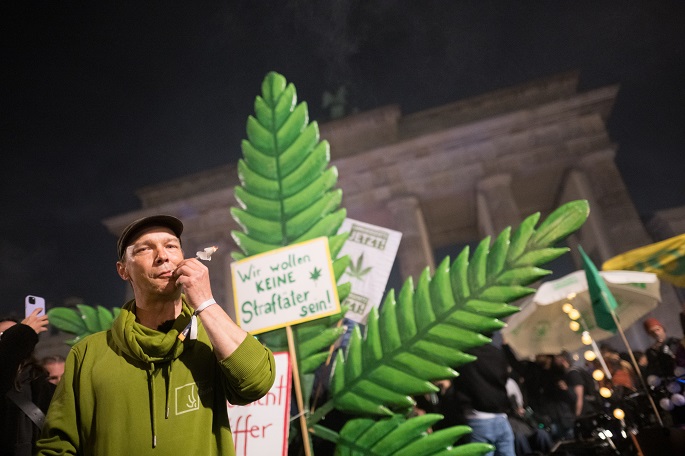Limited legalization of cannabis takes effect in Germany
Published : 01 Apr 2024, 20:57
The partial legalization of cannabis for personal use, which was championed by the centre-left government of Chancellor Olaf Scholz, took effect in Germany on Monday.
The Bundesrat, or upper house of parliament, let the long-debated bill pass last month after it was approved by the lower house, the Bundestag.
Shortly after midnight, several hundred people gathered in front of Berlin's Brandenburg Gate and lit up joints to celebrate the new law.
"We can finally show ourselves, we don't have to hide any more," Henry Plottke, a member of the German Cannabis Association (DHV), told dpa before the event began.
The landmark legislation allows for adult possession of up to 25 grams of cannabis for personal use in public.
Three live cannabis plants can now be grown legally at home and up to 50 grams of cannabis can be stored for personal use there.
Smoking weed in public spaces is to be banned in schools, sports facilities and within 100 metres of these facilities.
The three ruling coalition parties - the centre-left Social Democrats (SPD), Greens and liberal Free Democrats (FDP) - launched the plans despite great resistance from the opposition, the federal states and also from organizations.
The government argues that the prohibition policy has failed and that cannabis consumption has increased despite the ban.
The aim of the law is to combat the black market and reduce health risks. The active ingredient content of cannabis purchased from dealers is unknown and toxic additives and impurities could be present.
Justice Minister Marco Buschmann expects that the partial legalization of cannabis will mean less work for the judiciary and police in the medium term.
"The changeover will mean a one-off increase in workload, but in the long term the police and judiciary will be relieved," Buschmann told the Redaktionsnetzwerk Deutschland media group on Monday. "They will then be able to focus on even more relevant crime."
There are currently more than 100,000 criminal proceedings against cannabis users, Buschmann told the newspaper group. This is a sign that the current cannabis policy has failed, he said.
"It has placed a heavy burden on the police, public prosecutors and the judiciary, but in reality has hardly stopped consumption. Instead, users have been driven into the hands of dealers with inferior products and hard drugs."
The GdP police union, on the other hand, foresees problems with the implementation of the new law.
"Conflicts are pre-programmed," GdP deputy federal chairman Alexander Poitz told dpa in Berlin. "We are certain that the various ambiguities and lack of legal definitions will lead to noticeable dissatisfaction, uncertainty and errors among all those involved."
Poitz referred, for example, to different distance regulations to facilities such as schools. In addition, the police lacked items such as precision scales or analytical instruments for checks, he said.
The conservative opposition CDU/CSU bloc have vowed to revoke the legislation if they gain power.
"In our view, drugs policy, particularly with respect to protecting young people, is an issue of such central significance that we will revoke the legalization of cannabis in the event we take power," lawmaker Thorsten Frei told the Augsburger Allgemeine newspaper in remarks published on Saturday.


